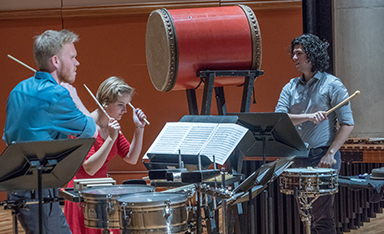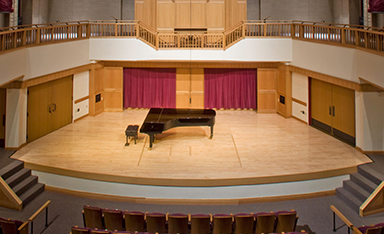Mari McCarville Student Profile
Mari McCarville takes life by the horns

When I ask what she is studying, she smiles and pauses. “Are you ready?” asks the Boettcher Scholar. McCarville is a senior double-major in flute performance and psychology; she is completing a minor in leadership studies through the Pioneer Leadership Program; she’s enrolled concurrently in the master’s program in curriculum and instruction through the Morgridge College of Education; and she is pursuing her teaching certificate in elementary education with an endorsement in culturally and linguistically diverse learners. Try saying that five times fast.
When I ask what it was like to grow up in Grand Junction, she corrects me. Do I know Crawford, the farming community of 400 an hour and a half east of Grand Junction? Well, she grew up outside of that.
But McCarville’s remote location did not inhibit her ambition. She started recorder lessons at age four—“I was hardcore,” she assures me—and took up the flute at eight. Inspired by a string quartet performance featuring Lamont faculty member and cellist Katharine Knight, McCarville declared that she wanted to play cello, as well, and started lessons at age ten. “As soon as I was tall enough,” she clarifies. As a child, she told her mother that she wanted to learn German. Her mother had always dreamt of teaching internationally, so the family relocated to Munich during McCarville’s middle-school years before moving back to Colorado.
Arriving at DU, McCarville immediately found a way to impact the community. In her first quarter, after eating a banana during a practice break at Lamont, “I had a banana peel and no place to compost it!” she remembers. Where she grew up, composting was the norm; being so far from town, it was a necessity.
Encouraged by her first-year seminar, “Trash and Zero Waste,” McCarville wrote a grant to DU’s Sustainability Committee to begin a composting program. She eventually created a series of zero-waste concerts with help from Newman Center staff and DU’s Center for Sustainability. The waste-sorting tri-bins now located at Lamont, each made from recycled materials themselves, are a direct result of her efforts.
Not everything was easy for McCarville at DU. “There were so many things in music that I’d never learned how to learn,” she recalls. Persistence and perseverance, qualities that come naturally to her, weren’t enough. “How do I learn to hear something? How do I learn to be musical?”
In addition to weekly flute lessons with Julie Thornton, whom she lauds as “so welcoming and supportive,” McCarville took lessons with Richard Slavich, the retired former cello professor at Lamont. She has performed in both large and small ensembles on flute and cello during her four years, and served for several quarters as the flute section leader in the Lamont Wind Ensemble.
When her junior year came, McCarville jumped at the chance to study abroad with DU’s Cherrington Global Scholars initiative, hoping to improve her German and study music in Europe. Salzburg was her ideal location, since her great-grandfather was Austrian. (Incidentally, her family is related by marriage to the von Trapps.)
The highlight of that semester abroad came when McCarville’s Salzburg orchestra director asked her to play cello in a concert one evening. He gave her an address and asked her to wear all black, omitting any further details. The program’s campus was adjacent to the famous gazebo from The Sound of Music, and as chance would have it, the address McCarville arrived at was the von Trapp house from the film.
“I checked the address three times to make sure it was right,” McCarville recounts. Inside, the grand hall was set up to record a music video. She was to be the cellist in a string quartet backing up Austrian pop singer DJ Ötzi. The footage, she learned, would be used in a movie called Stille Nacht: Ein Lied für die Welt (Silent Night: A Song for the World), a celebration of the 200th anniversary of the Christmas carol written near Salzburg. Besides DJ Ötzi, the musikfilm features artists like Kelly Clarkson, Josh Groban and the Vienna Boys Choir.
Seizing opportunities is a matter of course for McCarville. After hearing on the radio about the Music Cognition Lab at Vanderbilt University, she applied for and was awarded a Summer Research Grant from DU to be an assistant there. The program studies the overlap between rhythm and grammar in the brain, particularly as it pertains to language development in children. The work was fascinating, and it helped shape her future plans. “I realized that I want to work with kids not just as data points on a screen,” she says. “I want to make an impact on a day-to-day basis… for now!”
What is in store for the recent Phi Beta Kappa and Pi Kappa Lambda inductee? McCarville plans to teach internationally in elementary schools for a few years in order to formulate a research question. “It might be, ‘Where do we need more evidence-based intervention?’ ” she muses. “Or, ‘What do we need to better support students’ socio-emotional development?’ I want to answer a question that is really relevant and that could help people broadly.” She intends to make that topic the focus of her eventual PhD work.
Beyond that, McCarville wants to go into educational administration, start a non-profit organization, or do something, she says, “on the systemic level.” She will also continue to play and teach music privately.
What was the biggest factor in all of her success? Ultimately, McCarville believes that it was taking advantage of everything she could: not just the special programs at the University, but the experience and expertise of her peers and professors at DU. Building relationships with other students was very important, she says. “It’s competitive out there. People want to support each other, but if you don’t get to know them, it can become antagonistic.” To face academic challenges head-on, she confesses, “I spent so much time in office hours!” Having those extra conversations with teachers, in her opinion, “makes the learning so much more human and real.”
Armed with her myriad degrees, certifications, experiences, questions and ambitions, McCarville is destined to make an impact that is deep, “human and real,” with or without her instruments in hand.



